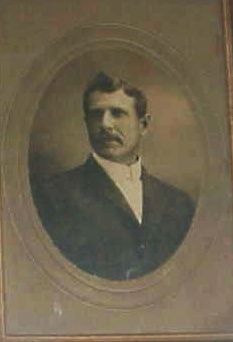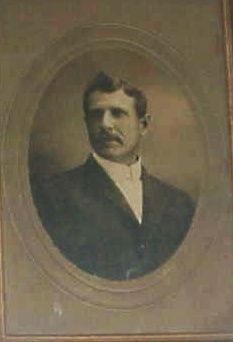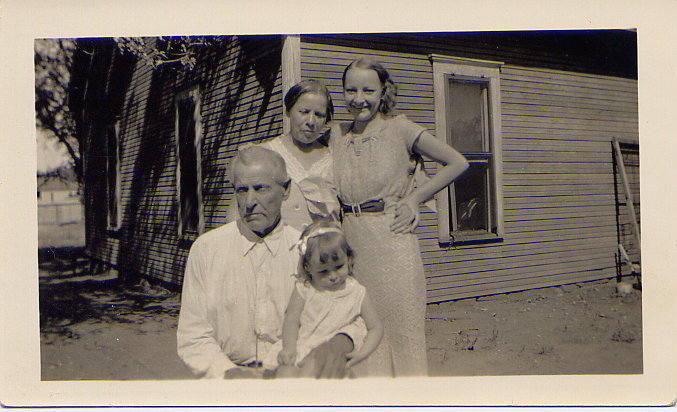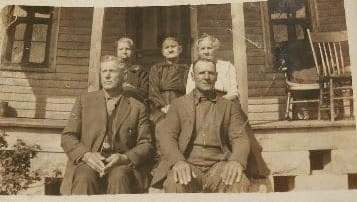July 8, 1937
Page 1
Death Of A.L. Griffin Recalls Stories Of Past
W.C. Bridwell Writes of Former Citizens In His 'Memories' Column In Glencoe Mirror.
-----
We see by The Cleveland American that A.L. Griffin is dead. He passed away at Cleveland at the age of 78, after a long life spent at hard labor. He came to Oklahoma at the opening of the strip and homesteaded on a quarter section in the Lone Chimney neighborhood, east of Glencoe. He remained on the homestead for several years after he made final proof and then moved to the neighborhood of Cleveland, where he spent the rest of his days.
I judge that he was born in the state of Illinois during the days when Abraham Lincoln was at the height of his renown in that state and that his father was a Republican, for they gave him the name of Abraham Lincoln, which was naturally abberviated [sic] to 'Abe', although he always used A.L. Griffin as his official signature. I did not become acquainted with Griffin until my return from Missouri in 1903 and from that time he and I were close friends.
The first thing that attracted me to him was that he was a baseball player, and although then nearly fifty years of age, he could still yield a mighty bat with considerable accuracy. He might have been a professional in his prime had he so desired but it would have been contrary to the guiding spirit of his life, for he never wanted more than came easy.
Abe Griffin was a socialist, not one of those radical, ranting ones but one who understood the theory of the movement but was never obnoxious with his views. He could spend hours in conversation without mentioning the subject but if one started the discussion, he must be well prepared to defend himself, or Abe would soon have [him]wound up like a little ball of yarn in short order. And yet, he did it so calmly that the other fellow could not get made save at his own inefficiency.
Abe Griffin was the leader of that party in the heyday or its glory in Oklahoma, in town and county, yet I never knew him to rest to the "soap box" during a campaign. Old-timers will remember that spring election when Cleveland surprised the world by electing almost the entire socialist ticket. None now living, save the writer, can tell more of the working of that campaign that I but it is too long a story to tell here. Back of it all was the silent figure of Griffin. Young Burns, who was elected mayor, could promise much and pass the buck deftly. W.E. Young, who was not elected city clerk, could spout fervently and wave his red card valiantly. But it was Griffin who made the promises that (Continued on Page 6)
Memories
(Continued from Page 1)
were kept, planned the campaign and afterwards dictated the policy of the administration that followed.
At that time, Abe was elected a member of the city council and when that body was organized he was chosen president thereof. He continued to serve in that position for two years, during which time he was acting mayor on several occasions and performed the duties satisfactorily. He was re-elected to the council two years later, but as the political complexion of that body had changed, he was not chosen to preside. Ever since then he has been a candidate for some office on the Socialist ticket, never being elected but polling a good vote in his home town.
While Abe was a Socialist, he refused to follow them in many of their vagaries. For one thing he refused to give up his belief in Protestant Christianity. His religion was of that undemonstrative kind that was lived rather than talked. As a result he was always found aligned with every movement for the moral uplift of the community.
There was one characteristic of his philosophy of life that made a deep impression upon me. I do not know whether I can explain so that you will understand it or not. I would call it 'the dignity of manual labor,' for the lack of a better definition. A.L. Griffin had the talent and ability to have risen to many positions of honor and trust. He was well educated, a good writer and a voracious reader. He could converse interestingly upon almost any topic of the times and was well versed in the historic lore of the past. He could have, had he so desired, risen to heights of glory had his ambition but called him to come up higher. Opportunity came to him not once but many times. I knew one time when he turned down a soft job with a fat salary, simply because of his belief in the dignity of manual labor.'
And so he continued to work with pick and shovel as the chief articles of his trade. Many a house rests upon foundations whose excavations were dug by him. Many cellars in the old home town, with the straight and upright walls and square corners are the work of his hands. He dug trenches for water, gas and sewer connections. In the silent city of the dead, once a long way out, now just outside the corporate limits, sleeps many a former friend in a tomb hollowed out of the rock by this man with his pick and shovel. Some time he would go to the timber with his ax and by hard manual labor work out some design from the trees of the forest.
During all these years I never heard him complain of the hardness of the task. I have seen him working knee-deep in the cold of winter, and in the blazing sun of 100 degrees of heat, without a murmur, all because of his belief in 'the dignity of manual labor.' And when the day's work was done, he went home with the assurance that he had done a great service.
Abe Griffin was a stout, well-built man, proud of his strength, but never abusing it with excess or stimulants, and so he worked on until near the end. Finally his strength failed him as human strength will sooner or later. He did not tarry long after he ceased to be able to do manual labor.
I do not know whether I have made plain to you the philosophy of Abe Griffin's life, his theory of the 'dignity of manual labor.' Other men have had the concept but he was the only one that I ever knew who actually lived up to it. He was proud of the fat that he had been able to wrest a living from the world by simple manual toll.
-----------------
Cleveland American
Cleveland, Pawnee County, Okla.
Thursday, June 24, 1937
The Pioneer Oil City of Oklahoma'
"Abe Griffin, Pioneer, Died Tuesday Morn
A.L. Griffin, 79, died at his home here Tuesday morning after a week's illness. He had been in poor health for the past year.
Funeral services are to be held Friday morning at 10 o'clock from the Christian church, with Rev. Williams officiating. Burial will be in the Mt. Pleasant cemetery, south of Pawnee.
Griffin was a pioneer in the county. He settled on a claim south of Pawnee in 1893, and came to Cleveland in 1899, and he has made his home here since that time.
During his residence he has been active in community affairs. He served on the city council, and also served as mayor. He was active in the early political affairs of the county and city.
Griffin is survived by six children, four daughters, Mrs. Cora Gunn and Mrs. Alice Belden of Cleveland, Mrs. Jessie Fairbanks of Bellingham, Wash., and Mrs. Ruth Buford of Tulsa; two sons, H.L. Griffin and Frank Griffin, both of Cleveland. Several grandchildren also survive.
July 8, 1937
Page 1
Death Of A.L. Griffin Recalls Stories Of Past
W.C. Bridwell Writes of Former Citizens In His 'Memories' Column In Glencoe Mirror.
-----
We see by The Cleveland American that A.L. Griffin is dead. He passed away at Cleveland at the age of 78, after a long life spent at hard labor. He came to Oklahoma at the opening of the strip and homesteaded on a quarter section in the Lone Chimney neighborhood, east of Glencoe. He remained on the homestead for several years after he made final proof and then moved to the neighborhood of Cleveland, where he spent the rest of his days.
I judge that he was born in the state of Illinois during the days when Abraham Lincoln was at the height of his renown in that state and that his father was a Republican, for they gave him the name of Abraham Lincoln, which was naturally abberviated [sic] to 'Abe', although he always used A.L. Griffin as his official signature. I did not become acquainted with Griffin until my return from Missouri in 1903 and from that time he and I were close friends.
The first thing that attracted me to him was that he was a baseball player, and although then nearly fifty years of age, he could still yield a mighty bat with considerable accuracy. He might have been a professional in his prime had he so desired but it would have been contrary to the guiding spirit of his life, for he never wanted more than came easy.
Abe Griffin was a socialist, not one of those radical, ranting ones but one who understood the theory of the movement but was never obnoxious with his views. He could spend hours in conversation without mentioning the subject but if one started the discussion, he must be well prepared to defend himself, or Abe would soon have [him]wound up like a little ball of yarn in short order. And yet, he did it so calmly that the other fellow could not get made save at his own inefficiency.
Abe Griffin was the leader of that party in the heyday or its glory in Oklahoma, in town and county, yet I never knew him to rest to the "soap box" during a campaign. Old-timers will remember that spring election when Cleveland surprised the world by electing almost the entire socialist ticket. None now living, save the writer, can tell more of the working of that campaign that I but it is too long a story to tell here. Back of it all was the silent figure of Griffin. Young Burns, who was elected mayor, could promise much and pass the buck deftly. W.E. Young, who was not elected city clerk, could spout fervently and wave his red card valiantly. But it was Griffin who made the promises that (Continued on Page 6)
Memories
(Continued from Page 1)
were kept, planned the campaign and afterwards dictated the policy of the administration that followed.
At that time, Abe was elected a member of the city council and when that body was organized he was chosen president thereof. He continued to serve in that position for two years, during which time he was acting mayor on several occasions and performed the duties satisfactorily. He was re-elected to the council two years later, but as the political complexion of that body had changed, he was not chosen to preside. Ever since then he has been a candidate for some office on the Socialist ticket, never being elected but polling a good vote in his home town.
While Abe was a Socialist, he refused to follow them in many of their vagaries. For one thing he refused to give up his belief in Protestant Christianity. His religion was of that undemonstrative kind that was lived rather than talked. As a result he was always found aligned with every movement for the moral uplift of the community.
There was one characteristic of his philosophy of life that made a deep impression upon me. I do not know whether I can explain so that you will understand it or not. I would call it 'the dignity of manual labor,' for the lack of a better definition. A.L. Griffin had the talent and ability to have risen to many positions of honor and trust. He was well educated, a good writer and a voracious reader. He could converse interestingly upon almost any topic of the times and was well versed in the historic lore of the past. He could have, had he so desired, risen to heights of glory had his ambition but called him to come up higher. Opportunity came to him not once but many times. I knew one time when he turned down a soft job with a fat salary, simply because of his belief in the dignity of manual labor.'
And so he continued to work with pick and shovel as the chief articles of his trade. Many a house rests upon foundations whose excavations were dug by him. Many cellars in the old home town, with the straight and upright walls and square corners are the work of his hands. He dug trenches for water, gas and sewer connections. In the silent city of the dead, once a long way out, now just outside the corporate limits, sleeps many a former friend in a tomb hollowed out of the rock by this man with his pick and shovel. Some time he would go to the timber with his ax and by hard manual labor work out some design from the trees of the forest.
During all these years I never heard him complain of the hardness of the task. I have seen him working knee-deep in the cold of winter, and in the blazing sun of 100 degrees of heat, without a murmur, all because of his belief in 'the dignity of manual labor.' And when the day's work was done, he went home with the assurance that he had done a great service.
Abe Griffin was a stout, well-built man, proud of his strength, but never abusing it with excess or stimulants, and so he worked on until near the end. Finally his strength failed him as human strength will sooner or later. He did not tarry long after he ceased to be able to do manual labor.
I do not know whether I have made plain to you the philosophy of Abe Griffin's life, his theory of the 'dignity of manual labor.' Other men have had the concept but he was the only one that I ever knew who actually lived up to it. He was proud of the fat that he had been able to wrest a living from the world by simple manual toll.
-----------------
Cleveland American
Cleveland, Pawnee County, Okla.
Thursday, June 24, 1937
The Pioneer Oil City of Oklahoma'
"Abe Griffin, Pioneer, Died Tuesday Morn
A.L. Griffin, 79, died at his home here Tuesday morning after a week's illness. He had been in poor health for the past year.
Funeral services are to be held Friday morning at 10 o'clock from the Christian church, with Rev. Williams officiating. Burial will be in the Mt. Pleasant cemetery, south of Pawnee.
Griffin was a pioneer in the county. He settled on a claim south of Pawnee in 1893, and came to Cleveland in 1899, and he has made his home here since that time.
During his residence he has been active in community affairs. He served on the city council, and also served as mayor. He was active in the early political affairs of the county and city.
Griffin is survived by six children, four daughters, Mrs. Cora Gunn and Mrs. Alice Belden of Cleveland, Mrs. Jessie Fairbanks of Bellingham, Wash., and Mrs. Ruth Buford of Tulsa; two sons, H.L. Griffin and Frank Griffin, both of Cleveland. Several grandchildren also survive.
Gravesite Details
Although his tombstone shows 1860, the death certificate on record shows date of birth to be March 4, 1858.
Family Members
Sponsored by Ancestry
Advertisement
Records on Ancestry
Advertisement






















